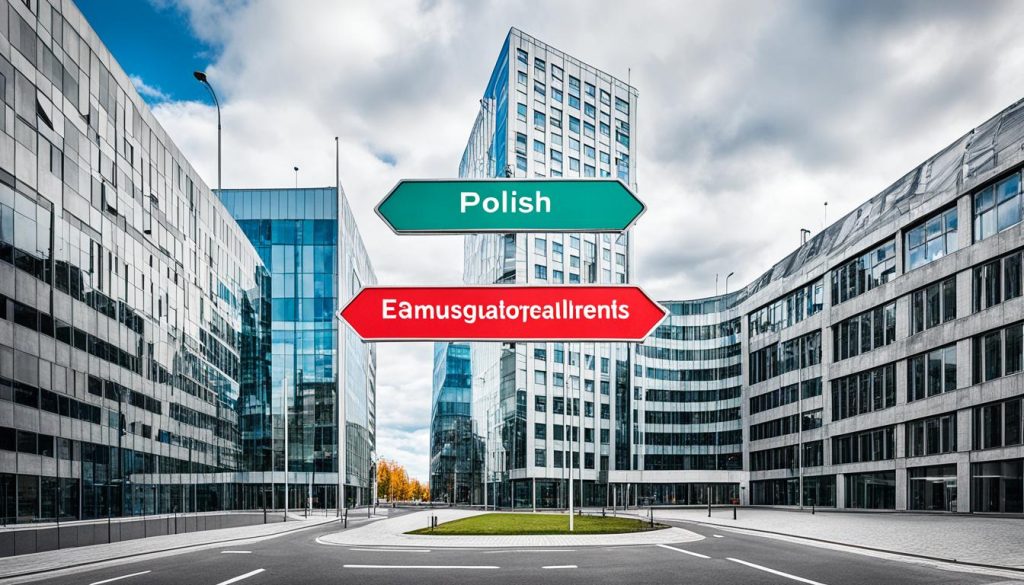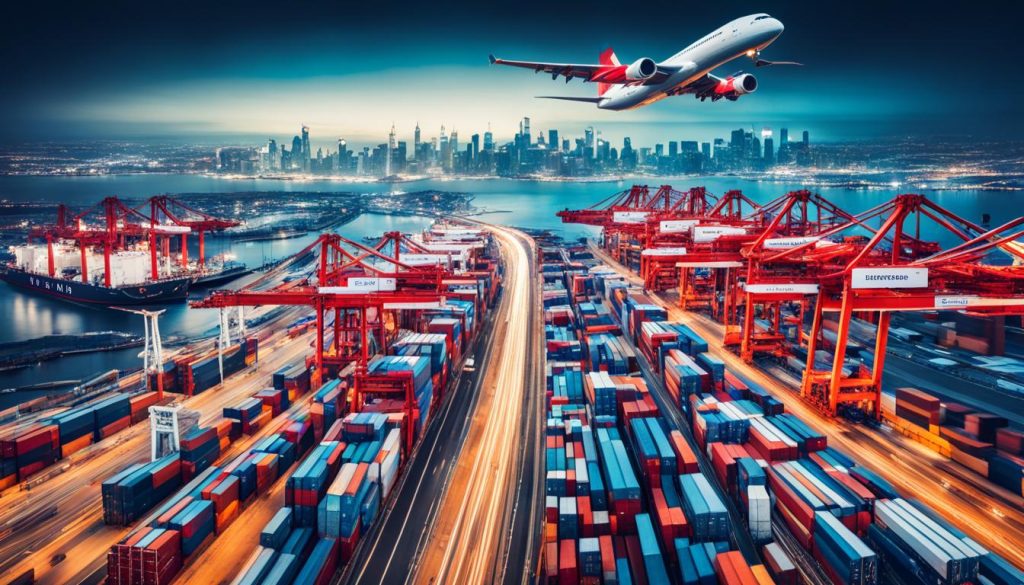The business world has many unique players. Each plays a vital role in the economy. Comparing Polish businesses to multinational companies shows us how different they are. They vary in size, reach, and how they are managed. They also impact the economy differently. Looking at these differences helps us understand how they meet market needs. It shows us how they adapt to changes in the business world too.
Key Takeaways
- Knowing about the Polish business scene is key to understanding its economic impact.
- Multinational companies work on a big scale. They have a wide reach and a varied team.
- Polish businesses and multinationals face different rules and challenges in their operations.
- Their impact on the economy is not the same. They contribute to local and global markets differently.
- The way Polish businesses and multinationals work shows their different operational and geographical backgrounds.
Understanding the Polish Business Landscape
The story of how Poland’s business world has changed is both rich and insightful. It sheds light on the nation’s economy today. Moving from a state-controlled system to a market-driven one shows Poland’s ability to adapt and grow.
Historical Context
After 1989, Poland began changing its economy towards a market system. This time is key in Polish economic history. It was when Poland moved away from communism. Reforms such as the Balcerowicz Plan were crucial. They privatised companies, opened up trade, and promoted competition. These steps helped Poland join the European Union in 2004, connecting it more with the world’s economy.
Modern Developments
Poland is now among Europe’s fastest-growing economies. It’s known for its dynamic small and medium-sized businesses. These enterprises push for new ideas, create jobs, and add to the economy’s strength. The digital era and tech progress are also making Poland’s market exciting for worldwide investors.
Poland’s path from a post-communist state to a global economic player is truly inspiring. Its business environment keeps evolving, showing a bright future for its economic goals.
Characteristics of Multinational Businesses
Multinational businesses stand out due to their wide reach across the globe and their teams from many cultures. They use their international presence to boost their standing in the market.
Global Presence
Multinational companies spread their wings by setting up in more than one country. This lets them enter different markets, making them more competitive. Famous firms like Unilever, Apple, and Toyota are everywhere, thanks to this approach.
Diverse Workforces
Having a diverse team is key for these companies. They hire people from various backgrounds to spark new ideas and creativity. This mix not only makes their culture richer but helps them connect with markets worldwide. Companies like Google and IBM are praised for hiring inclusively, boosting their global presence.
Legal and Regulatory Environments

Knowing the rules and regulations that businesses must follow is key. This is true for companies in one country or many. Let’s look at Poland’s business rules and how international laws affect big companies.
Compliance in Polish Businesses
In Poland, companies must follow a lot of rules. These include local laws, EU rules, and specific regulations for different sectors. This is to keep competition fair, protect customers, and look after the environment. Companies in Poland need to be smart about these rules to avoid fines and stay competitive.
- National Regulations
- EU Directives
- Industry-specific Standards
International Regulations for Multinationals
Big international companies face extra challenges. They must follow the rules in every country they work in, plus international laws. This means understanding a lot of different regulations and agreements. They need a good plan and knowledge of laws worldwide to make sure they follow all the rules.
| Polish Businesses | Multinational Corporations |
|---|---|
| National Business Regulatory Framework | International Business Law |
| EU Compliance Directives | Multiple Jurisdiction Regulations |
| Industry-specific Standards | International Treaties and Agreements |
Cultural Differences in Business Practices
Grasping cultural differences in business is key to cross-cultural management success. It helps when working in Polish companies and international ones. It’s about understanding workplace manners and corporate values.
Workplace Culture in Polish Companies
Polish workplaces value traditional norms and have a set hierarchy. Authority and rank matter a lot in making decisions. It’s usually a top-down approach.
Communication is formal and polite. Being on time and paying attention to details are important. These reflect a dedication to ethics and professionalism.
Multinational Corporate Cultures
On the other hand, multinational firms are usually more flexible and welcoming. They have workers from different backgrounds, making cross-cultural management vital. Decisions are made together, valuing everyone’s input.
The way people talk is straightforward and informal here. This openness encourages new ideas and clear conversations. There’s a big focus on respecting cultural differences and global ethics.
Economic Contributions
Polish companies and global businesses have a big impact on the economy. They help Poland’s GDP grow and draw in foreign investment. This is crucial for the country’s economy.
Impact on the Polish Economy
Local businesses are key to Poland’s economic progress. They create jobs and develop regions. This boosts Poland’s GDP, a main economic measure.
They also help build infrastructure and bring new technology. These steps are vital for Poland’s future.
Global Economic Influence of Multinationals
Worldwide firms have a huge role in the global economy. They boost the GDP of the countries they are in. They also provide many jobs around the world. confluent >
These companies help with foreign investment, improving economic stability and growth. They introduce new technology and increase productivity. This is good for the whole world.
| Entity | GDP Contribution | Employment Rate Impact | Foreign Direct Investment |
|---|---|---|---|
| Polish Businesses | Significant | High | Moderate |
| Multinational Corporations | Very High | Substantial | Very High |
Market Strategies

To succeed, businesses need effective market strategies, whether they’re in Poland or globally spread. We’ll look at how their approaches vary. Whether targeting local markets or aiming for global reach, the marketing tactics chosen play a crucial role in success amidst competition.
Local Market Focus
Polish companies lean on localising their approach to connect with their audience. They tailor products and services to fit Polish culture and language, meeting local needs. For example, Żywiec Brewery crafts its marketing to reflect Polish traditions, creating a strong local bond.
Global Market Penetration
In contrast, global companies strive to grow by applying broad marketing strategies. Unilever, for instance, combines standard and customised elements in their campaigns. This strategy ensures they keep a consistent image worldwide while adjusting for local tastes.
The tactics for reaching local versus global markets don’t just vary in scale. They also differ in how they engage with consumer needs, as shown in the table below:
| Aspect | Polish Businesses | Multinational Corporations |
|---|---|---|
| Marketing Tactics | Focused, culturally relevant | Widespread, adaptable |
| Localisation Strategy | Strong focus on cultural customisation | Balance of global and local adjustments |
| Global Expansion | Often slow and steady | Fast and ambitious |
Innovation and Technological Advancements
In today’s fast-paced business world, innovation and technology play key roles. Companies in Poland and around the globe use them to grow and stay ahead. They aim to be at the forefront of their markets.
Polish Business Innovations
Polish companies are boosting their R&D efforts to lead the way in innovation. CD Projekt Red has emerged as a top name in the gaming world thanks to this. They focus on innovation for steady, long-term growth and global competition.
Companies like Zortrax are also making waves in the 3D printing field. This shows Poland’s dedication to technological advancement.
Technological Leadership in MNCs
Big international firms, such as Google and IBM, also emphasize R&D and cutting-edge tech to stay on top. Their innovation helps them enter new markets and work more efficiently. They aim to lead in technology and set global standards.
| Company | Key Innovations | Impact |
|---|---|---|
| CD Projekt Red | Gaming Software | Global Market Leadership |
| Zortrax | 3D Printing | Industrial Revolution |
| AI Development | Enhanced User Experience | |
| IBM | Blockchain Technology | Secure Transactions |
The blend of local and global technological advancements highlights the importance of R&D. Both Polish companies and international giants show how innovation and tech growth are essential. They’re pushing the industry towards exciting new developments.
What is Polish vs multinational business?
The difference between Polish businesses and multinational corporations (MNCs) lies in how they work and their size. Polish companies usually stick to the local market and are often owned by families or small groups. On the other hand, multinational companies operate in many countries and have complex ownership.
Polish companies tend to grow slowly and steadily, focusing on being stable. Multinational firms seek fast growth by reaching into global markets. This shows the different goals and scales they operate on.
Ownership in Polish businesses often means family or close partners have control, making decisions quickly. In contrast, MNCs have a variety of shareholders, allowing for big investments. This affects their business strategies and helps them make a mark worldwide.
This comparison sheds light on how local and international businesses work differently. Polish companies focus on their home country, while multinationals aim to expand globally. This approach impacts how each reaches their goals and profits.
Challenges Faced by Polish Businesses
Polish companies face many hurdles in their growth and survival journey. These include financial issues and tough competition. Knowing these challenges is key for the growth of small and medium-sized businesses.
Financial Constraints
Limited access to funds is a big problem for Polish firms. Many small and medium enterprises (SMEs) find it hard to get enough money. This lack makes it hard for them to buy new technology, grow their business, and stand strong against competitors. Without enough funds, scaling up and making a mark in the market becomes a tough task.
Market Competition
Dealing with competition is another big hurdle. The Polish market has many big companies with lots of resources and well-known brands. This makes it hard for smaller businesses to make their own space. To succeed, Polish companies must come up with clever strategies and use their unique strengths.
| Challenge | Impact | Strategies for Overcoming |
|---|---|---|
| Financial Constraints | Limits investment capabilities and expansion | Diversifying funding sources, seeking government grants |
| Market Competition | Restricts market access and bargaining power | Innovative marketing, leveraging local strengths |
Challenges for Multinational Corporations
Operating in different countries brings many challenges for large companies. They have to deal with more than just money matters. They must also understand laws and culture in each place to keep things running well.
Regulatory Compliance
Dealing with various countries’ rules and laws is tough. Every country has its own set of laws about work, the environment, and taxes. Big companies must follow all these rules to avoid fines and keep their business going.
For example, drug companies face strict rules that can vary a lot between the European Union and the United States. This makes it really hard for companies to operate in different places.
Cultural Adaptation
It’s also hard for companies to fit into different cultures. They need to understand and manage differences in how people do business, talk, and buy things. Adapting to local cultures can make a company more liked and improve its business deals.
For instance, what works in ads in Western countries might not work in Asia. So, companies need special plans to attract people in different countries.
In the end, overcoming these global challenges needs a deep knowledge of laws and cultures. Making plans that take into account different rules and cultural differences is key for global success.
Human Resources and Talent Management
Effective human resources practices help both Polish firms and multinational corporations to stay ahead. They focus on strategies for hiring and managing talented people. By looking into how these companies hire and keep skilled workers, we understand their unique tactics.
Recruitment in Polish Firms
Polish companies focus on hiring from within the country. They value education and specific skills a lot. They use local connections and schools to find good candidates. Working with universities and vocational schools helps them find skilled professionals.
Talent Acquisition in MNCs
Multinational corporations take a global approach to hire. They use advanced technology and management systems for finding talent worldwide. Their hiring strategies aim for a diverse and skilled team. They also work hard on their image to attract people from all over.
Looking at these methods shows us how effective and fitting they are for different businesses. The way companies hire and develop their staff is key. It keeps their teams adaptable and innovative, no matter if they are local or international.
Local vs Global Supply Chains

In studying supply chain management, we see the use of local sourcing and global logistics. Local sourcing gets products from nearby businesses. This boosts the local economy and speeds up delivery. On the other hand, global logistics deals with the challenges of sourcing and distributing products worldwide.
| Aspect | Local Sourcing | Global Logistics |
|---|---|---|
| Cost | Often higher due to limited competition and higher local labour costs | Potentially lower through economies of scale, but may incur high shipping and tariff costs |
| Time | Faster lead times due to proximity | Longer lead times due to distance and customs clearance delays |
| Quality Control | Easier to monitor and enforce quality standards | Requires rigorous audits and frequent checks to maintain standards |
| Risk | Lower risks related to geopolitical and currency fluctuations | Higher risks from political instability, currency variations, and logistical disruptions |
| Sustainability | Generally more sustainable due to reduced carbon footprint | Often less sustainable owing to high transportation emissions |
For Polish businesses, local sourcing helps cut down on lead times and supports the local economy. But, it might raise the costs. Meanwhile, global logistics can offer a wider choice of suppliers and the chance for lower costs per unit. Yet, it brings about longer delivery times and greater risks. Thus, effective supply chain management strikes a balance. It mixes the upsides and downsides of both approaches for efficient and economical demand fulfilment.
Corporate Social Responsibility (CSR)
Corporate Social Responsibility (CSR) is key in today’s business world. Polish and international companies focus on being socially responsible, environmentally friendly, and ethical. This improves their image and helps the society and environment they operate in.
CSR Initiatives in Poland
In Poland, companies are stepping up with CSR efforts. PKN Orlen and LPP SA are leading by supporting communities with education and health programs. They also work on being more eco-friendly, like lowering carbon emissions and using green energy. This shows their dedication to a sustainable and caring business culture in Poland.
Global CSR Practices
Big global companies set high standards for CSR. Names like Unilever and Nestlé are at the forefront. They have broad CSR plans covering social, environmental, and ethical areas. From worldwide education to protecting nature, they prove it’s possible to do well around the globe. This boosts their global image and ensures they operate fairly and sustainably.
CSR shows the important role businesses have in leading a sustainable and ethical future, whether locally or globally. By committing to responsible practices, companies big or small can positively influence our world and its future.
















